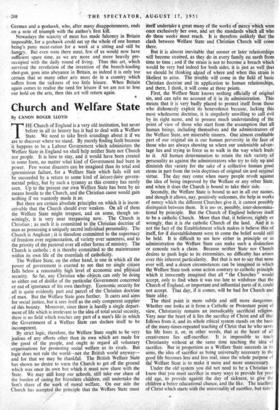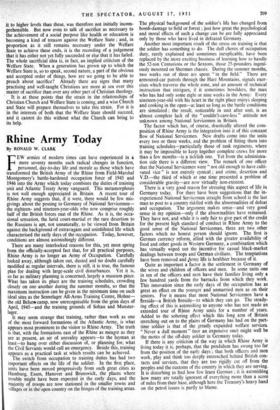Church and Welfare State
By CANON ROGER LLOYD . -
THE Church of England is a very old institution, but never before in all its history has it had to deal with a Welfare State. We need to take fresh soundings about it if we are to discover where we stand. By merely finding fault because it happens to be a Labour Government which administers the ' 'Welfare State in England we shall help neither State nor Church . nor _people. It is here to stay, and it would have been created in some form, no matter what kind of Government had been in power. Few worse disasters can be imagined than its total and ignominious failure, for a Welfare State which fails will not , be succeeded by a return to some kind of laissez-faire govern- mental policy, but by such a tyranny as this country has rarely seen. Up to the present our own Welfare State has been by no means hostile to the Church, and the Christian cause would gain nothing if we wantonly made it so. But there are certain absolute principles on which it is incon- ceivable that the Church should ever weaken. On all of them the Welfare State might trespass, and on some, though un- wittingly, it is very near trespassing now. The Church .is Christian ; as such it is committed to the Christian doctrine of man as possessing a uniquely sacred'individual personality. The Church is Anglican ;.it is therefore committed to the supremacy of freedom over regimentation, of variety over sameness, and to the priority of the pastoral over all other forms of, ministry The Church is catholic ; it is thereby committed to the maintenance within its own life of the essentials of catholicity.
The Welfare State, on the other hand, is one in which all the power of government is exerted to see that no single citizen falls below a reasonably high level of economic and physical . security. So far, any Christian who objects, can only be doing so either out of dislike of the particular Government concerned or out of ignorance of his own theology. Economic security for all is quite evidently part and parcel of the Christian doctrine . of man. But the Welfare State goes further. It cares and aims for social justice, but it sees itself as the only competent supplier of this bounty. Moreover, since there is hardly a single depart- ment of life which is irrelevant to the idea of total social security, there is no field which touches any part of a man's life in which - the Government of a Welfare State can declare itself to be incompetent. By strict logic, therefore, the Welfare State ought to be very jealous of any efforts other than its own which are made for the good of the people, and ought to regard all voluntary organisations for promoting social welfare as its rivals. But logic does not rule the world—not the British world anyway— and for that we may be thankful. The British Welfare State has shown no desire to warn the Church to get off the ground which was once its own but which it must now share with the State. We may still keep our schools, still take our share of the burden of caring for friendless children, still undertake the lion's share of the work of moral welfare. On our side the Church has accepted the' principle that the Welfare State must itself undertake a great many of the works of mercy which were once &elusively her own, and set the standards which all who do these works Must reach. It is therefore unlikely that the clash between Welfare State and Christian Church will come there.
But it is almost inevitable that sooner or later relationships will become strained, as they do in every family on earth from time to time ; and if the strain is not to become a breach which would be very bad indeed for both sides, it is just as well that we should be thinking akead of where and when this strain is likeliest to arise. The trouble will come in the field of basic Christian doctrine and its application to human relationships, and there, I think, it will come at three points. First, the Welfare State knows nothing officially of original sin, and can take no account of it in its administration. This means that it is very badly placed to protect itself from those who dishonestly exploit its benevolence because, lacking this most wholesome doctrine, it is singularly unwilling to call evil by its right name, and to possess much understanding of the pOint of view of those who start from the assumption that all human beings, including themselves and the administrators of the Welfare State, are miserable sinners. One almost creditable part of our original sin is our human perversity in the face 'of those who are always showing us where our undeniable advan- tage lies and trying to force us to walk in the way which leads to it. All human determination to retain the rich variety of personality as against the administrators who try to tidy up and diminish this variety for the sake of a collective human good stems in part from the twin doctrines of original sin and original virtue. The day may come when many people revolt against the idea of being improved by the Welfare or any other State, and when it does the Church is bound to take their side.
Secondly, the Welfare. State is bound to act in all our names, and though it allows, nay, positively welcomes, the help in works of mercy which the different Churches give it, it cannot possibly distinguish between them. It is un- or, possibly, inter-denomina- tional by principle. But the Church of England believes itself to be a catholic Church. More than that, it believes, rightly or wrongly, that it is the catholic Church of the land. And it is not the fact of the Establishment which makes it believe this of itself, for if disestablishment were tb come the belief would still be held. It is difficult to see' how either in principle or in administration the Welfare State can make such a distinction or concede such a claim. Because neither State nor Church desires to push logic to its extremities, no difficulty, has arisen over this inherent. particularity. But that is not to say that none ever will, and a.dozen circumstances can be imagined in which the Welfare State took some action contrary to catholic principle which it innocently imagined that all " the Churches ' would accept, only to find when it was too late to withdraw that the Church of England, or important and influential parts of it, could not accept. That day, if it comes; will be bad for Church and State alike.
The third point is more subtle and still more -dangerous. Whether one looks at it from a Catholic or Protestant point of view, Christianity remains an ineradicably sacrificial religion.
Very near the heart of it lies the sacrifice' of Christ and all that follows from it, and its whole ethical system stands on the basis of the many-times-repeated teaching of Christ that he who' saves his life loses it, or, in other words, that at the heart of all creativeness lies self-Sacrifice. It is impossible to teach Christianity without at the same time teaching the idea of sacrifice. But in proportion as a Welfare State succeeds in' its aims, the idea of sacrifice as being universally necessary to the good life becomes less and less real, since the whole purpose of the Welfare State is to make it more and more unnecessary. Under the old' system you did not need to be a Christian to know that you must sacrifice in many ways to provide for your old age, to provide agairis't the day of sickness, to give the children a better educational chance, and the like. The teaching of Christ which starts with the universality of sacrifice, but raises it to higher levels than these, was therefore not initially incom- prehensible. But now even to talk of sacrifice as necessary to the achievement of a social purpose like health or education is becoming a kind of treason against the Welfare State ; and, in proportion as it still remains necessary under the Welfare State to achieve these ends, it is the recording of a judgement that it has either not yet fully succeeded or else that it has failed. The whole sacrificial idea is, in fact, an implied criticism of the Welfare State. When a generation has grown up to which the Welfare State is, so to speak, second nature, a part of the obvious and accepted order of things, how are we going to be able to preach about sacrifice? Already there are signs that many practising and well-taught Christians are more at sea over this matter of sacrifice than over any other part of Christian theology. It is at these points that the strain in the relationships of Christian Church and Welfare State is coming, and a wise Church and State will prepare themselves to take this strain. For it is in the interests of both that the Welfare State should succeed, and it cannot do this without what the Church can bring to its help.































 Previous page
Previous page